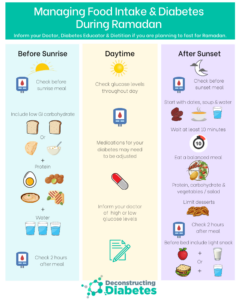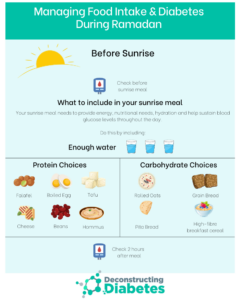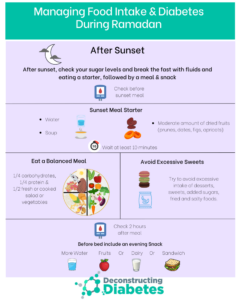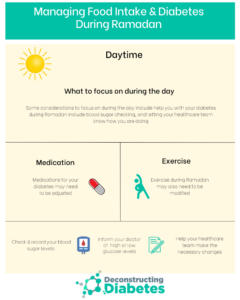Sign up to our newsletter
Get the latest news and views from Healthcare Central London, our member Practices and partners.
News
26 Feb 2025
Throughout Ramadan, for those managing diabetes who take part, it’s even more vital to make mindful choices with food during this reflective month. Fasting from dawn to sunset is best paired with a balanced approach to diet for optimum health and well-being, especially for those with blood sugar concerns.
When it comes to navigating fasting with diabetes, careful planning with safeguards in place can be an ideal first step.
When the fast begins, your body shifts into a state of conservation. With no food or drink entering the system, it first taps into the glucose from your last meal. Once that’s depleted, it turns to stored carbohydrates in the liver and muscles, and eventually, fat reserves.
Becoming dehydrated while fasting isn’t uncommon. Your kidneys work hard to conserve water, but losses through sweat, breath, and other functions are inevitable. Mild dehydration can lead to headaches, fatigue, and difficulty concentrating — symptoms that can be more pronounced for people with diabetes.

Suhoor, the meal before sunrise, is your foundation for the day ahead. Think of it as a carefully laid table of sustenance. This means:

As the sun dips below the horizon, fasts are often broken with dates and water. Dates offer a quick burst of natural sugars, but for those with diabetes, a slightly different approach might be needed. You could follow this with a balanced meal:

Fasting can send blood sugar levels on a rollercoaster. Regular monitoring is your best tool for staying in control.
High blood sugar (hyperglycaemia) can happen if you overeat at Iftar or Suhoor, while low blood sugar (hypoglycaemia) may happen if meals are skipped, or medication is mismanaged.
Light exercise, such as a post-iftar stroll or gentle pilates, can aid digestion and boost energy levels. Having said this, do avoid strenuous activity during fasting hours, as it can make dehydration much worse.
Hydration is paramount. Sip water steadily between iftar and suhoor, but avoid drinking large quantities at once, as this can dull your appetite for nourishing foods.

Those with darker skin should consider supplementing every day, all year, as they’re at higher risk for low vitamin D levels. This is because bodies naturally absorb vitamin D from the sun, something the UK doesn’t get very much of in winter. Plus, melanin (the substance that makes skin darker) blocks part of this absorption process too.
The festival marking the end of Ramadan is marked (in part) by joy, feasting, and togetherness. While Eid al-Fitr is absolutely the time to indulge, a balanced approach is key when managing diabetes. Especially when you’re easing back into more frequent eating again, without lengthy fasting periods.
For more information on how to manage diabetes safely during Ramadan, click here.
For a factsheet on fasting with diabetes directly from the British Muslim Medical Association, follow this link. At HCL, we’re wishing everyone a peaceful and nourishing Ramadan. Ramadan Mubarak to all who celebrate.
Get the latest news and views from Healthcare Central London, our member Practices and partners.